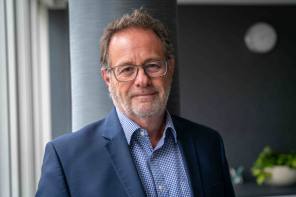

Before your head conjures up images of a grown adult splashing around in the deep end of the local lido, it should be noted that Mr Barry could already, impressively, swim two miles – he just wanted to do it faster.
The younger Mr Barry would never have even thought about seeking help and coaching to improve performance, because, in his words: “In the past I had the mindset that I knew everything.”
However, that all changed in May 2014 when Mr Barry, while working for JPMorgan Asset Management, was transferred to work in its New York office.
“A friend of mine said to me, ‘You’ll need to reinvent yourself’, to which I replied, ‘I don’t want to,’” Mr Barry says.
But after some back and forth, he conceded that his friend’s claims had some merit, and that working in a different environment, in a foreign country, would require adaptation in order to succeed.
Looking back, Mr Barry says this period had a profound effect on his personal development.
“I think I’m a very different person now.
“What it taught me was that you don’t actually know anything, in reality, and the moment you realise that, it’s fantastic.
“In the past I thought I knew everything, and so I was very loathe to try new things and do them differently.”
A student of politics at university, whose first job was at a political lobbying company, Mr Barry returned to the UK in 2017 after spending three years in New York and has tipped past the second year in his current role.
“What’s interesting about Legg Mason is that we have a number of different affiliates [and] asset managers.
“But recently, we’ve also invested in tech in other parts of the world and now in the UK as we’re trying to take advantage of how the market is evolving and the market is changing, and also become much more focused around retirement and decumulation.”
What this has also meant is that Mr Barry has experienced what the advice markets look like on both sides of the Atlantic, and there is one noticeable difference.
“In the US everything is bigger. I was looking after two of the big [companies] – Merrill Lynch and Wells Fargo – and between them they had 30,000 financial advisers, which is more than the entire UK market.”
Mr Barry concedes, however, that the fundamental aspects of the advice process remain the same.
“Ultimately they’re looking to do the same thing, which is solve financial problems for their clients, and over there the tax regime is far more complex than it is here so quite a strong degree of financial planning comes into play as well.”
Social surge
It is becoming a more complex time to be operating in active asset management, too.
Many eyes from many quarters are focusing on the sector, with costs under a great deal of scrutiny; particularly whether active managers can justify the additional fees charged over their passive counterparts.
But there are a number of positive news stories, according to Mr Barry. One of these is the surge of environmental, social and governance strategies, with active managers having a key role to play in its growing popularity.
“There are people out there who believe that ESG is the saviour of the active asset management industry, which is a grandiose claim but certainly we do have a role to play,” he says, adding that Legg Mason has seen a dramatic increase in interest in this area since the start of the year.
“ESG’s been around for a long time but the catalyst now has been global warming and the blue planet and the situation around plastics.
“In the past there was always a reason to do it, but people thought you were going to sacrifice returns which they didn’t want to do.
“But now there’s empirical evidence that suggests it’s not the case and also I think that climate change, which always was on the edge of the agenda, is now very, very mainstream – as it should be – and people are genuinely concerned.”
Being defensive
In the shorter term, growing pessimism concerning the future of global economies has meant investors are taking a more cautious approach within their portfolios.
Mr Barry explains that Legg Mason has seen greater interest in defensive assets such as infrastructure, short duration funds, cash and even gold.
“People were saying, ‘We’ve done well for the first six months of the year, now is the time to start battening down the hatches a bit, because there’s a lot of uncertainty around, a lot of volatility, and we’re a long way into the run’,” he says.
Further out, he says, decumulation will continue to be the biggest opportunity for advisers and asset managers over the coming years.
“When I joined Legg Mason, I was told we were looking to make a strategic investment in the UK in order to better align ourselves to the decumulation trend.”
Whether this will mean the advice wheel is reinvented remains to be seen. But as Mr Barry will testify, reinvention can be good thing.
Craig Rickman is special projects editor of Financial Adviser and FTAdviser.com



